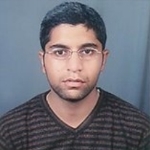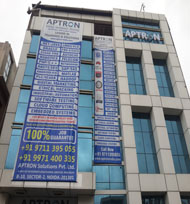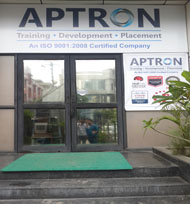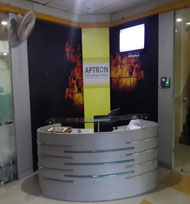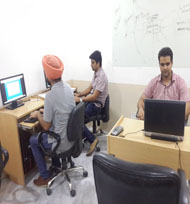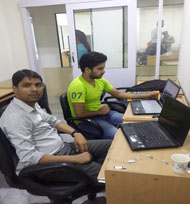Best Project based Winter Training in Ethical Hacking & Training Institute in Noida

 4
out of 5
based on 23 ratings.
5 user reviews.
4
out of 5
based on 23 ratings.
5 user reviews.
live Project based winter training in Ethical Hacking with ARM9 imparts the knowledge and skills to codes for Linux based ethical hacking systems. The course curriculum is divided into different modules focusing on important concepts related to Embedded Linux, Real Time System (RTOS), ARM9 microcontroller, and Linux Kernel. Training will be executed on ARM9 development board.
Linux and Embedded Linux are explained in detail to build the foundation for working and implementing ethical hacking systems. Participants will gain insight on different development tools including GCC compiler, GDB debugger, GDB server, trace and profiling tools. The learners will practice the development of Graphical User Interface (GUI) applications using the QT framework. The training also explains on the requirement of RTOS and differentiate between hard RTOS and soft RTOS. Different functions of operating systems including process management, memory management, system calls, virtual file system, and interrupt handling are explained to understand the internal working of a device. Various interfacing techniques such as I2C, SPI, ADC, DAC, and USB are also discussed. On the basis of this knowledge, the aspirants will reach the stage of writing device driver codes.
Ethical Hacking are involved in almost every facet of modern life. All modern luxury equipment’s like Digital Cameras, Mobile Phones, GPS Devices, Cars, Bikes, Televisions, DVD Players, Video Games, Pagers, PDAs, Answering Machines, Microwave Ovens, Network Routers, Fax Machines, Music Synthesizers, Planes, Spacecraft, and Boats are some of the examples of Ethical Hacking.
Late model cars may contain as many as 65 ethical hacking microprocessors, controlling such tasks as Antilock braking, climate control, engine control, audio system control, airbag deployment etc.
Logic analyzers and digital storage oscilloscopes utilize ethical hacking processors to support real-time operation. Even PCs, which are designed around powerful CPU such as the Intel Pentium 4, contain ethical hacking systems. Floppy and hard disk drives, CD-RW and DVD-ROM drives, and external peripherals such as printers, scanners, and other SCSI, USB, or IEEE 1394 devices all contain ethical hacking processors.
In a particular year, microprocessor manufacturers sold on the order of 100 million processors for use as computer CPUs. In comparison, during the same time frame, microprocessor manufacturers sold more than 3 billion ethical hacking processors, primarily consisting of 32-bit, 16-bit, 8-bit, and 4-bit devices. The tremendous number of applications for ethical hacking computing has given rise to high demand for engineers with experience in designing and implementing ethical hacking systems.
Aptron's Project-based Winter Training in Embedded Sysytem Covers the Following Modules
Winter Training in Ethical Hacking is a modular winter course, regularized over 5 days a week, 2 hrs a day, and exclusively includes practical sessions. The course curriculum of Winter Training in Ethical Hacking comprises:
- Module 01: Introduction to Ethical Hacking
- Module 02: Footprinting and Reconnaissance
- Module 03: Scanning Networks
- Module 04: Enumeration
- Module 05: System Hacking
- Module 06: Trojans and Backdoors
- Module 07: Viruses and Worms
- Module 08: Sniffers
- Module 09: Social Engineering
- Module 10: Denial of Service
- Module 11: Session Hijacking
- Module 12: Hacking Webservers
- Module 13: Hacking Web Applications
- Module 14: SQL Injection
- Module 15: Hacking Wireless Networks
- Module 16: Hacking Mobile Platforms
- Module 17: Evading IDS, Firewalls, and Honeypots
- Module 18: Buffer Overflow
- Module 19: Cryptography
Winter Training Based Projects List in Ethical Hacking Technologies
- IDS-Intrusion Detection System
- PXE Server
- FTP Server
- Hosting of multiple Websites on single IP
- University Management using DHCP Server
- Denial Of Service Attack Real Time Implementation
APTRON Project Based Trainig Course duration for Ethical Hacking Technologies in Noida
- Fast Track Training Program (6+ hours daily)
- Regular Classes (Morning, Day time & Evening)
- Weekend Training Classes (Saturday, Sunday & Holidays)
Recent Placed Students
APTRON Training Center
APTRON Training Courses Noida
- iOS Apps Developemnt Training Noida
- Software Testing Training Noida
- QTP Training Noida
- Selenium Training Noida
- Oracle Training Noida
- STAAD.PRO Training Noida
- ANSYS Training Noida
- Appium Training Noida
- AWS Training Noida
- AUTO CAD Training Noida
- Data Warehousing Training Noida
- CAM Training Noida
- CATIA Training Noida
- Networking Training Noida
- CCNA Training Noida
- HMI Training Noida
- SAP Training Noida
- SharePoint Training Noida
- Android Training Noida
- Linux Admin Training Noida
- Cloud Computing Training Noida
- Salesforce Training Noida
- VMware Training Noida
- Ethical Hacking Training Noida
- ITIL Training Noida
- PHP Training Noida
Winter Training in Ethical Hacking Noida Reviews
Rating:

Rating:

Rating:

Rating:











